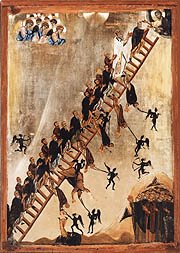The Ladder Part 1

The Ladder

Background: Written
Saint John Climacus was a 6th century monk and abbot of the monastery of Saint Catherine on
-inspired by the image of Jacob’s ladder.
-monastic spiritually is only different in degree not kind. We all must follow the same basic path toward God. The difference between monastics and secular Christian is the degree to which we can apply the truths or commandments of the gospel.
-divided into three parts. 1. The Break with the World 2. The Practice of the Virtues (Active) 3.
-the following study relies heavily on Fr. John Mack's Ascending the Heights which is a worthy addition to a copy of the Ladder.
Step 1 On Renunciation of Life
“of all created and rational beings, endowed with the dignity of free will, some are friends of God, some are His true servants, some are useless servants, some are entirely estranged, and there are some who, for all their weakness, take their stand against Him.”
Who are you?
“Withdrawal from the world is a willing hatred of all that is materially prized, a denial of nature for the sake of what is above nature.”
-a matter of focus; what are we living for? What is our motivation? Earthly or eternal.
*If we have an eternal perspective, what does that change about the way that we live?
-St. John speaks of this not only in terms of more spiritual virtures but even in physical ones, and that our bodies react violently when we try to subdue it.
-must remember our goal….union with God and enjoyment of the presence of God for all eternity. Not to be better fasters or better humanitarians, but to be united with God.
*What motivates us to turn our backs on the world?
-we are not alone on the journey, but have Christ to strengthen and motivate us throughout (2 Cor. 5).
-we have each other “do not separate yourselves from the church assemblies.”
Jhn 15:11These things have I spoken unto you, that my joy might remain in you, and [that] your joy might be full.
Jhn 10:10The thief cometh not, but for to steal, and to kill, and to destroy: I am come that they might have life, and that they might have [it] more abundantly.
Some people living carelessly in the world have asked me; “We have wives and are beset with social cares, and how can we lead the solitary life?” I replied to them: “Do all the good you can; do not speak evil of anyone; do not steal from anyone; do not lie to anyone; do not be arrogant towards anyone; do not hate anyone; do not be absent from the divine services; be compassionate to the needy; do not offend anyone; do not wreck another man’s domestic happiness, and be content with what your own wives can give you. If you behave in this way, you will not be far from the
Step 2 On Detachment
*Is there anything that you hold to tightly to? Anything that would pain you to give up? Anything earthly that consumes your attention?
*What are things that we can become easily attached to?
- As a personal illustration, my grandfather gave me an expensive pen as a graduation present several years back. Believe it or not, I still have it. Actually, I found it a couple of months ago. Because of the cost of the pen and the sentimental value attached I began using it again; however, I found myself constantly worried about its condition and whereabouts. One day, I realized this ridiculous situation that I was in, but it made me aware of how attached we can become to so little.
*How do we unattach ourselves?
“Let us aside all earthly cares, that we may receive the King of all you comes upbourne by the angelic hosts”
-John also warns of attachement to the praise of men.
-to be free from the concern for things and for the opinion of others is a great gift that St. John calls to be cleansed of grief.
“This is the second step, and if you take it, then do as
Step 3 On Exile
Exile is a separation from everything, in order that one may hold on totally to God…an exile is a fugitive, running from all relationships with his own relatives and with strangers.
1 Pet. 2:11
Matt. 10:37, 38
John 15:18ff
*What does this say about our relationships with other?
This does not mean that we reject relationships. In fact, we are saved in the context of community with each other. We are called to love one another, and if we are married we are called to love sacrificially. Relationships must be put into proper perspective. They must not take the place of God in our lives, or allow our relationship with God to be hindered.
Run from places of sin as from the plague. For when fruit is not present, we have no frequent desire to eat it.
Comments